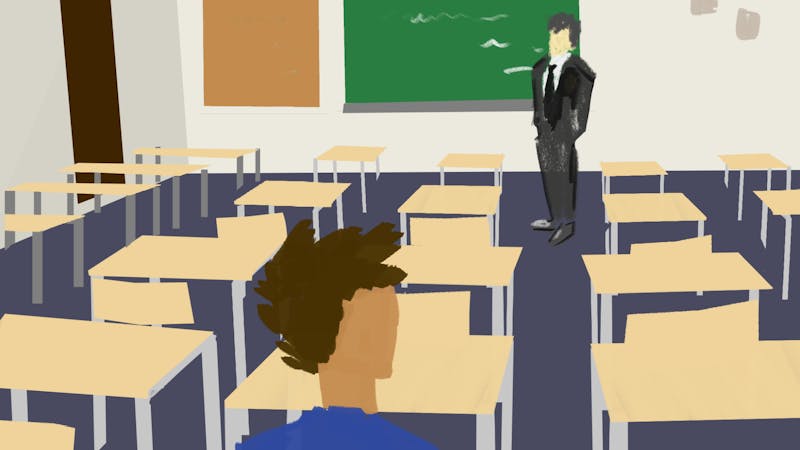"Father of the Internet” Vint Cerf discusses the past, present and future of the Internet
(Full talk can be found online at: https://www.youtube.com/watch?v=kmTy-C0WI9w)
Vint Cerf discussed the history of the internet as well as its impact on modern society on Sept. 13 as part of the Baker Institute’s Civil Scientist Lecture Series.
Cerf is known, along with Bob Kahn, for co-designing the Transmission Control Protocol/Internet Protocol procedures that control internet communications, an accomplishment that earned Cerf and Kahn the collective title, “fathers of the internet.”
Since 2005, Cerf has served as vice president and chief internet evangelist at Google, a title given to him by Larry Page and Sergey Brin, the company’s founders, as well as Eric Schmidt, the company’s CEO at the time.
“The hazard of this particular title became apparent to me when I was lecturing in Moscow and I had four public appearances, and at the end of every single one, somebody got up and said ‘Dr. Cerf, do you believe in God?’” Cerf said. “So I thought for a little while, and I said, ‘Well, I'm Geek Orthodox.’”
In his speech, Cerf covered the past, present and future of the internet, starting with his and Kahn’s creation of TCP protocol.
In order to make TCP understandable, Cerf used the analogy of attempting to send a friend a book in the mail, but being forced to go through a postal system that only accepted postcards, necessitating cutting up the book’s pages and taping them to individual postcards.
“You'd realize that not every postcard would have a page number because you cut them up and you know that they could get out of order so you number every postcard, and you keep copies just in case,” Cerf said. “Then you wonder ‘Well how do I know when my friend has gotten all of the postcards?’ And you have your friend send you a postcard saying ‘I got everything up to postcard number 420,’ except then you realize that that postcard might get lost, and so you check whether or not you've gotten any responses from your friend from the postcards you've sent and if you haven't gotten any, then you start sending duplicates until you finally do get a postcard from your friend saying that they’ve received your postcards.”
IP, on the other hand, was designed by Cerf and Kahn in six months to interconnect separate internet communication networks. After writing a paper on their design for IP protocol, they put their ideas to the test.
“I remember leaping up and down saying ‘It works! It works!’” Cerf said. “It's software, and it's a miracle whenever software works.”
Cerf also discussed a variety of internet-related issues and areas of development for the future, including the importance of security when developing Internet of Things devices.
“I have temperature sensors in every room in my house and every five minutes, they record the temperature [and] I know you'd think only a geek would do that and that's probably true,” Cerf said. “But imagine if somebody intercepts that data. They can figure out what the diurnal patterns are in my house, how many people are in the house, which rooms they occupy and are they at home or not. If you're planning to break into the house, that particular information would be a vulnerability for me. So we have to think really carefully about the design and implementation of these systems to take into consideration people's safety, privacy and security.”
Cerf also briefly covered the recent spread of fake news across social media sites.
“We see a lot of misinformation and disinformation floating around especially in social media and how important it is to teach young people and ourselves critical thinking about the content that we see on the net,” Cerf said. “It's easy for one person to inject misinformation into the internet and amplify that with botnets — machines that are capable of distributing content and denial service attacks — so there's a highly asymmetric environment here that we never had before.”
Additionally, Cerf expressed his desire for Rice’s computer science department to instruct its students on the importance of ethics in software development.
“I'm hoping the computer science department will teach programmers and systems engineers that they have an ethical responsibility to be thoughtful and careful about the software that they release on the unsuspecting public,” Cerf said.
Cerf ended his talk with a few words of wisdom for future internet pioneers.
“Despite the fact that the internet has been around for over four decades, the future isn't written yet,” Cerf said. “There's still more to be done and it's in the hands of young people to invent new ways to use the technology, to evolve it and to make it work better.”
More from The Rice Thresher

Jones wins men’s and women’s Beer Bike races, GSA snags alumni
Jones College won both the women’s and men’s Beer Bike 2024 races, while the Graduate Student Association claimed the alumni team win. Hanszen College bike teams were the runner-up in the alumni and men’s races, while Brown College was the runner-up in the women’s race. Martel and McMurtry Colleges did not bike in the alumni race, according to the Rice Program Council’s final report, and the GSA was disqualified from the men’s race for accidentally sending out two bikers simultaneously.

Rice wraps up Conversations on the Middle East series, looks to fall semester
With the final session rescheduled to Wednesday April 17, the Conversations on the Middle East series is coming to a close.

Rice SJP hosts protest in response to S.RES 02 tabling
Rice Students for Justice in Palestine staged a walkout and protest in response to the tabling of S.RES 02, a resolution that proposed a divestment of student funds to Israel-aligned companies, outside the Allen Center, April 12. The protest occurred during Owl Days, when prospective students were touring the campus.

Please note All comments are eligible for publication by The Rice Thresher.